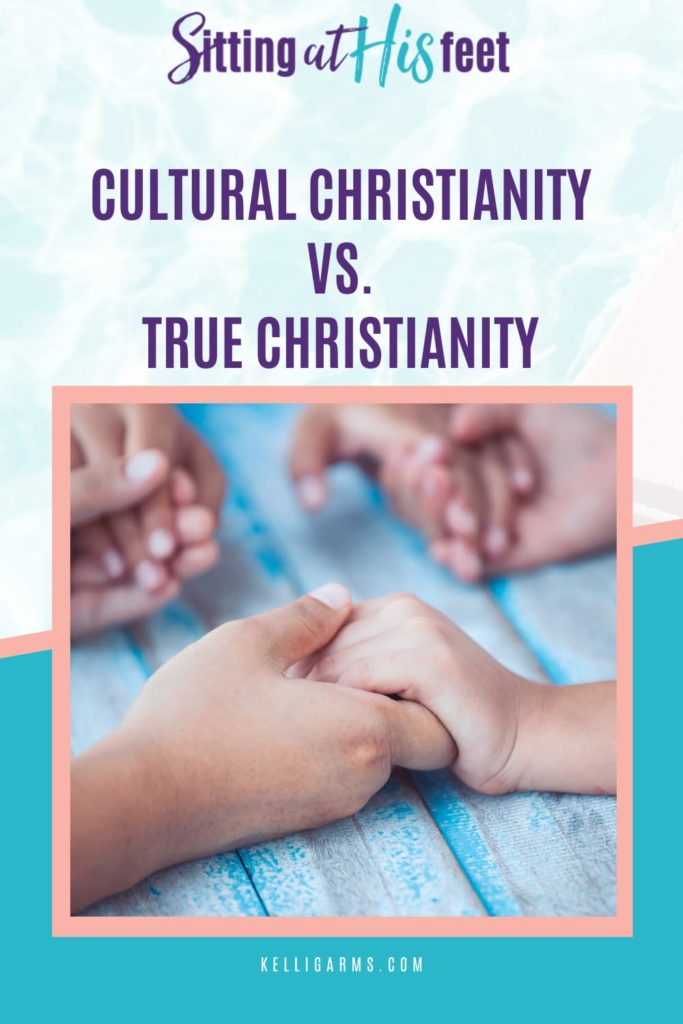For so long in our country, Christianity has been the norm. Events weren’t planned on Sundays because it was expected that most families would be in church. Telling someone you were at a church event didn’t raise any eyebrows. Even now, when the tide seems to be turning, you will find people in church at least twice each year: Christmas and Easter.
But as times change, the pendulum appears to be swinging, and it is no longer “cool” to be a Christian. There is a certain amount of pressure being applied for people to leave the church and disregard its teachings. And one thing is clear, our churches have been full of cultural Christians and nominal Christians.
Nominal and Cultural Christianity
Nominal Christians are those who aren’t firmly grounded in the Word. They may know all of the Sunday school answers and may even be familiar with most of the stories in the Bible, but they don’t have a deep personal relationship with Christ. And when it is a little uncomfortable to stand on biblical principles against their friends, neighbors, or family members, they fall away.
Cultural Christians are those who think they are grounded in the Word. They might even be teachers and preachers. But when the Gospel butts up against a cultural issue, the cultural Christian twists Scripture to fit the culture rather than standing up for Truth.
If you visit a country where Christians are persecuted; where they are beaten and imprisoned; where they risk losing their families, homes, and jobs just for deciding to follow Christ, you will not meet any cultural Christians. Cultural Christianity only happens in countries where Christianity is comfortable and maybe even expected.
Scripture gives us a great example of cultural Christianity when the Israelites were in the wilderness.
The Golden Calf
The Israelites had witnessed the plagues in Egypt. They had watched God part the Red Sea and had wiped the dust, not mud, off their feet on the other side. They had witnessed the thunder and fire on Mt. Sinai before Moses climbed it. Yet they allowed the culture to dictate their beliefs instead of trusting what God had said.
In Exodus 32, we see the Israelites take gold they had plundered from the Egyptians (Ex. 12:35-36) that was meant for the tabernacle (Ex. 25:1-7) and give it to Aaron, Moses’s brother and the future priest of Israel, demanding he make an idol. Aaron’s leadership was dictated by popular opinion, not by what God had said or done. As soon as it was no longer popular to be godly, Aaron caved to what the people wanted.

Once the calf was crafted, the people worshipped it and said, “These are the gods who brought us out of Egypt!”
Every time I read this passage, I wonder if there was anyone in the crowd who spoke up. How could the Israelites watch Aaron make this statue from the gold they provided and then worship it, claiming it brought them out of Egypt? Surely there were those in the crowd who refused to worship. But did they speak up?
The other thing I wonder is how Aaron must have felt as soon as Moses stepped off the mountain and saw the sin of the people. We get an idea when Aaron immediately starts making excuses. He reminds Moses how the people are “set on evil,” and he claims he threw the gold in the fire and “out came this calf.” I’m sure his heart broke and he never forgot the consequences of this sin as he watched while 3,000 people died because they were determined to turn their backs on God.
Are We Any Better?
It is easy for us to shake our heads at Aaron and the Israelites. This seems like such an obvious infraction. Surely, we would never do such a thing! But as I watch my social media feed and hear respected Bible teachers offer up a false gospel that is motivated by cultural ideas rather than Scripture, I wonder if we are really that much better than the Israelites.
My pastor often says,
“What one generation tolerates, the next generation accepts, and the next generation embraces.”
As Christians in America, we have sat silent while the culture infiltrates our churches. We have been tolerant as cultural Christians preach a false gospel. We have “loved” others while accepting their sin.
There are things in Scripture that are open to interpretation. That is why there are different denominations. But there are many things in the Bible that God commands his followers to obey. There is no question. There is no doubt. They are clear. Yet we try to blur the line and redefine words to justify them through our cultural lenses.
True Christianity
But there is hope! I also see the church waking up! I see true believers standing for what is right and resisting cultural Christianity. I see preachers upholding truth against the attacks of the enemy that seem to be coming from every direction. It isn’t too late to stand up. It isn’t too late to teach Truth. We can push back against the cultural and social ideas that are threatening Christianity. But it will take courage; it might take sacrifice; it won’t be easy.
So how do we do it? How do we make sure our Christianity is true with all of the ideas being thrown at us? We have to start with Scripture, not culture. We have to know the Word so we can allow our worldview to be shaped by Truth. If we allow Scripture to dictate our worldview, when an unbiblical idea comes our way, we will recognize it for what it is.
That’s what it means to be a true Christian. It means the truth of the Gospel is more important than your comfort, your wealth, and even your life.






Amen, sister! May we be found in scripture, loving truth and hearts after God and not our idols.
Thank you so much for this article! It succinctly articulates what has so long been on my heart. So many only want their ears scratched. I pray for people to hunger for and seek truth.
You’re welcome!
Honestly, this whole article needs to be better explained, starting with what you deem ‘cultural issues’ and then explaining how ‘culture infiltrates our churches’. Different denominations have different views on almost every topic, and to call yourself a Christian, you need to believe that Jesus is the Way, the Truth and the Life. Everything after that is a matter of theological textual criticism and understanding how to live life according to Christ’s guidance in our ever-changing world.
I honestly think those ideas are pretty well explained in the article. While different religions may have different views on almost every topic, different denominations agree on the most important ones, otherwise, they are not Christian. I agree that one needs to believe that Jesus is the Way, the Truth, and the Life, but we must define Jesus the way the Scriptures do. Jesus also says that those who love Him will keep His commandments, so there is more to Christianity. It is important what we believe about Jesus, but it is also important what we believe about the Bible, the Trinity, sin, etc. We learn how to view these things as we spend time in God’s Word and under solid teaching.